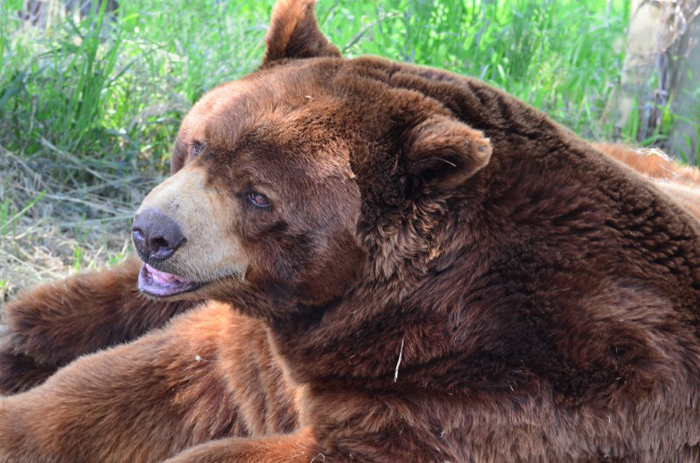Spring weather brings the reminder to be ‘Bear Aware’

VALLEY – Colorado Parks and Wildlife reminds outdoor recreationists, city dwellers and rural homeowners that early spring is the time to become Bear Aware. As bears emerge from hibernation, all Coloradans need to be responsible and take steps to minimize human-bear interactions.
It’s important to think ahead and be Bear Aware now when preparing your home, neighborhood and outdoor plans with the change in seasons. Bears are omnivores and primarily eat vegetation such as grasses, forbs, berries, acorns, and seeds, which are usually available as bears emerge from hibernation.
Human-bear interactions tend to increase in the summer months, however, when a late frost or warm, dry weather can lead to localized natural food failures. This can cause black bears from affected areas to become more mobile and persistent in search of human food sources like trash, fruit trees, pet food, bird feeders, livestock and agricultural products. Bears have an extremely keen sense of smell and excellent memories, and once they have learned about a reliable source of food, they will often return.
“It’s critical for folks to remember that if a bear finds a meal in or around your home and becomes unafraid of people, it is more likely that a human-bear interaction can occur,” said Mark Lamb, area wildlife manager for CPW. “Careless behavior by people, whether leaving your trash out, keeping a dirty campsite or, worst of all, purposely feeding a bear, is most often what leads to these interactions. Unfortunately, our wildlife managers are then tasked to remedy many avoidable problems.”
CPW officials say black bears typically do not hunt humans in Colorado; however, because they are large powerful animals, they pose a very serious risk to human health and safety when they become conditioned to finding meals from human sources.
“If you accidentally corner or surprise a bear, remember that one bite or swipe from that bear could lead to a person receiving life-threatening injuries, or worse,” said Lamb. “Human health and safety is always our primary concern.”
It requires diligence on the part of people to keep bears from becoming human food-dependent at home or while recreating. That effort can begin now; establishing proper Bear Aware behavior in the spring can create good habits that help minimize conflicts throughout the year.
Tips to prevent human/bear conflicts for homeowners include:
Keep garbage in a well-secured enclosure and only put out garbage on the morning of pickup.
Use a bear-resistant trash can or dumpster. These are available from your trash hauler or on Internet sites.
Clean all garbage cans regularly to keep them odor free. The scent of ammonia can deter bears.
Take down all bird feeders -- birds don’t need to be fed during the summer. Bird feeders are a major source of bear/human conflicts.
Don’t leave pet food or stock feed outside -- never provide food sources for any wildlife.
Keep garage doors closed.
Review CPW’s Bearproofing Your Home Fact Sheet (http://cpw.state.co.us/Documents/Education/LivingWithWildlife/BearproofingYourHome.pdf)
Conduct a home audit to be sure you are not attracting bears to your property.
Talk to your neighbors and kids about being bear aware. (http://cpw.state.co.us/Documents/Education/LivingWithWildlife/Bears-Home-Audit-Checklist.pdf)
Tips for outdoor recreationists and travelers:
Read CPW’s Camping and Hiking in Bear Country page to prepare for your trip. (http://cpw.state.co.us/learn/Pages/LivingwithWildlifeCampingBearCountry.aspx)
Pay attention to the surroundings and watch for bear signs, such as tracks or claw or bite marks on trees.
Make noise while walking or hiking to prevent surprising a bear. Clap, sing or talk loudly. Travel in a group if possible.
Do not keep food in your vehicle; roll up windows and lock the doors of your vehicles.
When car-camping, secure all food and coolers in a locked vehicle after you’ve eaten.
Keep a clean camp, whether you’re in a campground or in the back-country.
When camping in the back-country, hang food 100 feet or more from your campsite
Cook food well away from your tent; wash dishes thoroughly.
Don’t bring any food or fragrant items into your tent.
Review CPW’s Camping and Hiking in Bear Country brochure. (http://cpw.state.co.us/Documents/Education/LivingWithWildlife/CampingHikingInBearCountry.pdf)
Recreationists, residents and visitors are reminded to contact the nearest Colorado Parks and Wildlife office to file a report of injured or problem wildlife. For more information about Living with Bears, visit: http://cpw.state.co.us/learn/Pages/LivingwithWildlifeWildBears.aspx.
Caption: Colorado Parks and Wildlife reminds you that spring is the season to be Bear Aware. Learn how to do your part to help keep our wildlife wild./Courtesy photo



